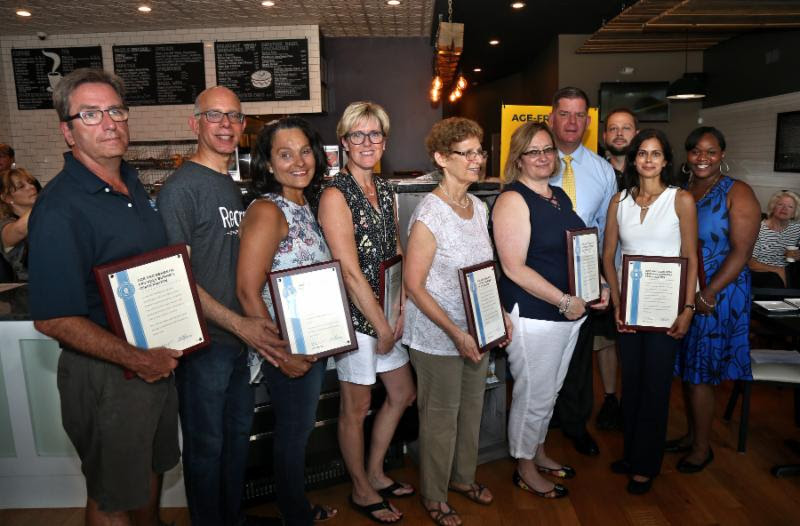Age and Dementia-Friendly Business designation launched
The pilot program encourages local businesses to make their spaces and services more inclusive for people of all ages.
Mayor Martin J. Walsh and the City of Boston's Age Strong Commission today launched their Age and Dementia-Friendly Business designation, a new pilot program that encourages local businesses to make their spaces and services more inclusive for people of all ages. Today's announcement was held at Local 338 Bagels and Coffee in West Roxbury, one of nine organizations that received the designation today, which includes certificates and decals to mark their business as Age and Dementia-Friendly.
"In Boston, we are committed to making our city the most age-friendly city in America," said Mayor Walsh. "Part of that commitment requires us to be able to respond to the needs of our older residents to make sure they feel safe and supported in their community. Today as we celebrate the businesses who have committed to age-friendly customer service in their establishments, we are able to remark on all the progress made and accomplishments achieved in making Boston a better place for everyone to age well and live well."
Businesses who are eligible for the designation are ones that have taken steps such as ensuring they have respectful and patient staff, providing resting areas and non-slip flooring and using universal symbols, such as arrows. The nine other establishments receiving the designation include: Parkway Real Estate, Cryotherapy, West on Centre, Health Express, BCYF Roche Center, Human Harmonies, Milton Chiropractic and Bay State Physical Therapy, Recreo Coffee and Roasterie, and Parkway Hearing.
To qualify for the designation, businesses had to meet certain criteria, which includes improvements that would benefit older residents, such as accessible bathrooms, wider aisles, menus with larger font sizes, and better lighting. These important accessibility improvements have been shared through resident feedback gathered as part of the Age-Friendly Boston Action Plan, the City's blueprint to make Boston the best city to live for older adults within three years.
The Age and Dementia-Friendly Business designation is one of the action items included in the plan, which is marking its one year of completion through the new Age-Friendly Year 1 Achievements Report which shares the successes made over the last year in making Boston an age-friendly city.
Highlights of Year 1 Completed Action Items Include:
- Launched interactive restrooms map of all city-owned public restrooms as a resource for older residents.
- Curated an Employment Guide with current workforce training programs and career development opportunities for older workers. Included as an action item, the Age Strong Commission committed to identifying and addressing the barriers to employment for people over 50 in our city.
- Designed front-facing City staff training to educate employees on the unique needs of older adults, including those with dementia.
- Developed a pilot senior Civic Academy a five-session course where residents of diverse backgrounds and neighborhoods of the city came together to learn about municipal, state, and federal policy and how to become effective advocates.
- Launched Age and Dementia-Friendly Business designation to encourage local businesses to make their spaces and services more inclusive for people of all ages.
"During the first year of the implementation process, I am very impressed by the dedication of the Age Strong Commission staff and other City of Boston staff," said 66-year-old South End resident Roger Tepe, who is and advisory member of the Age-Friendly workgroup. "Significant progress is already underway. I am very hopeful as a senior living in Boston about where the Age-Friendly Plan is heading."
"These accomplishments reflect the wisdom and input of community voices from all neighborhoods across the city," said Nora Moreno Cargie, president of Tufts Health Plan and vice president for corporate citizenship at Tufts Health Plan. "Boston's commitment to making the city work for all residents will ensure vibrant, livable, accessible neighborhoods."
Jan Mutchler, Director of the Center for Social and Demographic Research on Aging at UMass Boston and Age-Friendly Boston partner, said, "We are delighted with the progress made by the City during its first year carrying out the Age Friendly Boston Action Plan. The leadership in the City, and the partnerships established to make this initiative successfully, are impressive. UMass Boston Gerontology is proud to be an ongoing partner in this effort.
In 2014, Mayor Walsh signed onto the World Health Organization's (WHO) network of Age-Friendly Cities, through their United States partner AARP, and launched the Age-Friendly Boston Initiative. Under Mayor Walsh's leadership, the Age Strong Commission formed a partnership with UMass Boston Gerontology Institute, supported by a grant from the Tufts Health Plan Foundation, to conduct research based on the guidelines set forth by the WHO. Grounded in community feedback, the plan identifies recommendations and action items the City will take to enhance the quality of life for Boston's older adult residents.
Developed in partnership with AARP, the Tufts Health Plan Foundation and UMass Boston, the 75 action items in the Action Plan were developed through 25 listening sessions, featuring engagement from over 4,000 older residents throughout Boston. The Action Plan is organized around eight key life domains, or main concerns.
The complete Age-Friendly Boston Action Plan and Year 1 Achievements Report are available at: boston.gov/age-friendly.
About Age-Friendly CitiesThe guiding principle of an Age-Friendly society focuses on designing livable communities that promote good health, strong civic participation and clear communication. That means safe, walkable streets; offering better housing and transportation options; improving access to key services and providing opportunities to be socially engaged. It means sustaining economic growth and enabling happier, healthier residents.
About the Age strong CommissionThe Age Strong Commission facilitates full and equal participation in all aspects of life by older adults in Boston. The commission is dedicated to improving the lives of Boston's older adults by connecting them with resources and information, and it is focused on setting the City's direction for successful aging in Boston.


